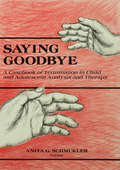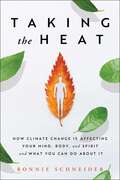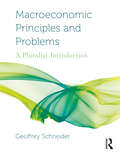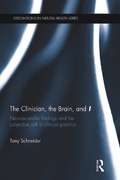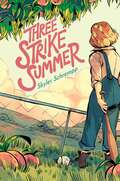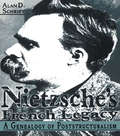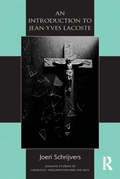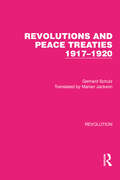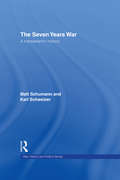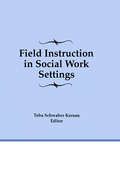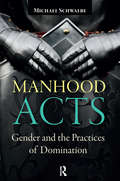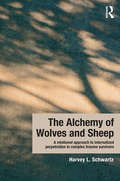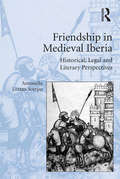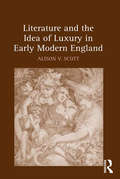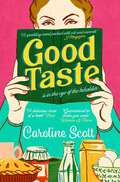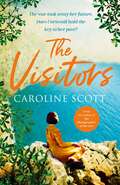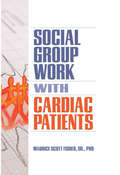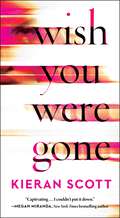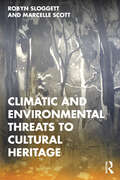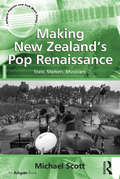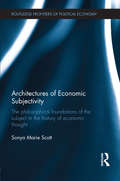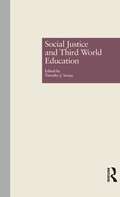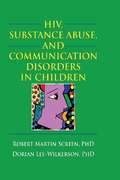Special Collections
Benetech’s Global Certified Accessible Titles
Description: Benetech’s GCA program is the first independent third-party EPUB certification to verify ebook accessibility. By creating content that is born accessible, publishers can meet the needs of all readers. Learn more: https://bornaccessible.benetech.org/
- Table View
- List View
Saying Goodbye
by Anita G. SchmuklerTermination of psychoanalysis or psychotherapy is centrally important both to the process of treatment and to the patient's experience of treatment. It is surprising, then, that there has heretofore been no comprehensive study of the subject. This book begins to bridge the gap in this area. It is the first volume devoted entirely to issues surrounding the ending of treatment in analytic and therapeutic work with children and adolescents. Organized into separate clinical and theoretical sections, framed by a preface and sectional introductions, and covering a wide range of psychopathology, this book explores the different ways in which children and adolescents grapple with the experience of separation at the conclusion of treatment. Of special note is the contributors' recognition that the parents of children ending treatment face their own termination experience in relinquishing the support of their child's therapist. The presentations are enriched, as well, by frank discussions of countertransference as it enters into the termination phase of treatment.
Taking the Heat
by Bonnie SchneiderFrom meteorologist and Peabody Award–winning journalist Bonnie Schneider, an innovative look at how climate change is already threatening our mental and physical health and practical tips for you to tackle these challenges head on.The impacts of climate change have become dire. Rising temperatures, volatile weather, and poor air quality affect our physical and mental health in dangerous new ways. From increasing the risk of infectious disease to amplifying emotional stress and anxiety—even the healthiest among us are at risk. Bonnie Schneider has tracked environmentally-linked physiological impacts throughout her career as a TV journalist, meteorologist, and the founder of Weather & Wellness©—a platform that explores the connection between weather, climate change, and health. In Taking the Heat, Schneider provides crucial advice from science experts and medical professionals to help you: -Cope with the mental anguish of &“eco-anxiety&” and other climate change fears for our planet&’s future, particularly expressed by millennials and Gen-Z -Identify health hazards caused by extreme heat and air pollution that disproportionally affect low-income and minority communities -Uncover the science behind longer and stronger allergy seasons and learn new ways to reduce your risk of adverse allergic reactions -Detect the increased threat of dangerous pathogens lurking in unexpected places and why we may face future pandemics -Understand how seasonal fluctuations of sunlight, heat, and humidity can not only factor into feelings of depression and anxiety but also can trigger flare-ups for certain auto-immune diseases -Discover how meditation and mindfulness practices can ease the psychological stress that often occurs in the aftermath of devastating natural disasters -Explore how the Earth&’s rising temperatures may rob you of restorative sleep and impair mental sharpness -Learn why increased levels of CO2 in the atmosphere may reduce the availability of what you choose to eat; learn sustainable solutions—from food to fitness - And more! Anchored in the latest scientific research and filled with relatable first-person stories, this book is the one guide you need to navigate the future of your own health—mind, body, and spirit, in a rapidly changing environment.
Macroeconomic Principles and Problems
by Geoffrey SchneiderMacroeconomic Principles and Problems: A Pluralist Introduction offers a comprehensive overview of the major topics in modern macroeconomics, from mainstream and heterodox perspectives. This textbook examines the key macroeconomic problems and policy debates facing contemporary society, including economic crises, sustainability, fiscal and monetary policy, government debt, state-led vs. market-led approaches for growth, and unregulated trade vs. protectionism. Written in an engaging style and focused on real-world examples, this textbook brings macroeconomics to life. Multiple examples of how each economic model works, coupled with critical analysis of the assumptions behind them, enable students to develop a sophisticated understanding of the material. Digital supplements are also available for students and instructors. Macroeconomic Principles and Problems offers the most contemporary and complete package for any pluralist macroeconomics principles class.
The Clinician, the Brain, and 'I'
by Tony SchneiderThe clinician needs to make sense of many client experiences in the course of daily practice: do these experiences reflect the simple product of complex neurochemical activity, or do they represent another dynamic involving the subjective self? When research findings from the neurosciences are applied to clinical psychology, reductionist thinking is typically followed, but this creates problems for the clinical practitioner. In this book Tony Schneider draws together the three strands of philosophy, neuroscience, and psychology to explore the mind/body question as it affects the clinician. Taking a position more closely aligned with dualism, he argues for the utility in making distinctions between brain activity and ‘I’ – the subjective self – both in general psychological functioning and in psychopathology. Schneider considers traditional psychological topics contextualized by neuroscience research and the mind/body issue, as well as applying the ideas to various areas of clinical practice. Topics include: -the mind and body from the clinician’s perspective -fundamental aspects of the role and mechanics of the brain -the developing self and the relationship of ‘I’ with the self and with others -psychological functioning such as focus and memory, sleep and dreaming, and emotions and pain. The idea that ‘I am not my brain’ will resonate with many clinicians, and is systematically argued for in clinical literature and neuropsychology research here for the first time. The book will be of particular interest to psychologists, psychiatrists, counsellors and clinicians who wish to incorporate advances in neuroscience research in the conceptualization of their clinical work, and are looking for a working model that allows them to do so.
Three Strike Summer
by Skyler Schrempp&“Told in a voice that is so real it reeks of filched peaches, this book is a home run.&” —Amy Sarig King, Printz Award–winning author of Dig and The Year We Fell from Space Sandlot meets Esperanza Rising in this lyrical middle grade novel set in the 1930s about a strong-willed girl who finds her voice in a tale of moxie, peaches, and determination to thrive despite the odds.When the skies dried up, Gloria thought it was temporary. When the dust storms rolled in, she thought they would pass. But now the bank man&’s come to take the family farm, and Pa&’s decided to up and move to California in search of work. They&’ll pick fruit, he says, until they can save up enough money to buy land of their own again. There are only three rules at the Santa Ana Holdsten Peach Orchard: No stealing product. No drunkenness or gambling. And absolutely no organizing. Well, Gloria Mae Willard isn&’t about to organize any peaches, no ma&’am. She&’s got more on her mind than that. Like the secret, all-boys baseball team she&’s desperate to play for, if only they&’d give her a chance. Or the way that wages keep going down. The way their company lodgings are dirty and smelly, and everyone seems intent on leaving her out of everything. But Gloria has never been the type to wait around for permission. If the boys won&’t let her play, she&’ll find a way to make them. If the people around her are keeping secrets, then she&’ll keep a few of her own. And if the boss men at the Santa Ana Holdsten Peach Orchard say she can&’t organize peaches, then by golly she&’ll organize a whole ball game.
Nietzsche's French Legacy
by Alan SchriftFirst published in 1996. Routledge is an imprint of Taylor & Francis, an informa company.
An Introduction to Jean-Yves Lacoste
by Joeri SchrijversIntroducing the thought of philosopher and theologian Jean-Yves Lacoste, this book provides an overview spanning Lacoste's earliest works on sacramentality to his latest work Etre en Danger (2011) in which Lacoste opens up the liturgical experience onto a spiritual experience of life. Schrijvers unfolds the logic of what Lacoste calls 'the liturgical experience' from its violent variety in Expérience et Absolu to the logic of love and love's possibility as it is developed in the later works. Throughout the book, the focus is on Lacoste's dialogue with Heidegger and through this his attempt to widen the scope of phenomenology to include the phenomenality of the divine.
Revolutions and Peace Treaties 1917–1920
by Gerhard SchulzThis book, first published in 1972, is an analysis of popular movements, political convulsions and settlements that led to and resulted from the climax of the First World War and its aftermath. It considers the aims, achievements and failures of both the Allied and Central Powers, the major internal changes which took place during and just after the war, and the significance of the newly shaped Europe and Near East which emerged from the peace treaties.
The Seven Years War
by Matt Schumann and Karl W. SchweizerThe Seven Years War has been described as the first global conflict in history. It engulfed the Euro-Atlantic world from 1756 to 1763, and engaged the energies of European cabinets as never before. More than previous conflicts, the Seven Years War involved a variety of approaches to war, and taxed the military, material and moral resources of the powers involved. Drawing on a diverse array of archival, printed primary and secondary sources, The Seven Years War: A Transatlantic History covers the war’s origins, its conduct on land and at sea, its effects on logistics and finance, its interactions with domestic politics, its influence on international relations and its approach to peace. The book highlights the role of personality, alongside the enduring importance of communication, misperception and understanding. In so doing, it endeavours not merely to chronicle the war’s events, but to situate them in the context of mid-eighteenth century warfare, finance, politics and diplomacy. The Seven Years War will be of great interest to students of the European history, American history, maritime history, diplomatic and military history.
Field Instruction in Social Work Settings
by Toba Schwaber KersonField Instruction in Social Work Settings explores the relationship between field instruction and the setting in which it occurs. The book asserts that certain aspects of social work, including laws, funding, political climate, organizational policies, and values, affect the relationship between student and field instructor and shape teaching and learning. The book explores dimensions of the student/field instructor relationship such as goals and expectations, development of professional identity, uses of the self, issues of diversity, authority, dependency, autonomy, value dilemmas, and the structure of supervision. It presents a framework for teaching field instruction and uses the framework to explore its relevance, meaning, and use in the following settings: perinatal AIDS program public child welfare child advocacy agency public school occupational health and safety project family service psychiatric hospital case management program for the elderly day center for the elderlyField Instruction in Social Work Settings is the only book available relating field instruction to the specific context in which it occurs. It recognizes the social work field’s diminished budget and increased demands and points out the critical necessity of students learning to address and manage policy and organizational issues as they develop their social work skills. This book is an aid to field instructors balancing increases in enrollment and curriculum content and decreases in placements and budgets. It integrates all of these concerns with field practice and seeks to provide a model for those working in the field as instructors and students. Field Instruction in Social Work Settings applies classroom material to social work settings and emphasizes the value of field instruction by relating it to the branches of child welfare, mental health, and health care. It allows the reader to integrate social work policy and advocacy with field work, and it provides the reader with an appreciation of how social work and field instruction can work together directly.
Manhood Acts
by Michael SchwalbeIn Manhood Acts Michael Schwalbe offers a new perspective on the social construction of manhood and its relationship to male domination. Schwalbe argues that study of masculinity has lost touch with its feminist roots and has been seduced by the politically safe notion of 'multiple masculinities'. Manhood Acts delineates the practices males use to construct 'women' and 'men' as unequal categories. Schwalbe reclaims the radical feminist insights that gender is a field of domination, not a field of play, and that manhood is fundamentally about exerting or resisting control. Manhood Acts arrives at the conclusion that abolishing gender as a system of oppression will require more than transgressive self-presentation. It will be necessary to end the exploitive economic relationships that necessitate manhood itself.
The Alchemy of Wolves and Sheep
by Harvey L. SchwartzThe literature on psychological trauma and traumatic attachment has progressed over the past few decades, however issues of coerced and internalized perpetration have not been fully explored and deconstructed. This book presents a synthesis of relational and archetypal psychology, trauma and dissociation theory, and highly relevant child soldier literature, to offer new clinical perspectives to assist psychotherapists and trauma patients to achieve more successful therapy outcomes. The Alchemy of Wolves and Sheep offers instructive, cautionary and innovative therapeutic approaches to help transform the lives of survivors of complex trauma. Providing an explanation of how the effects of coerced perpetration trauma are built, and the damage done to the psyches and lives of most trauma victims, the book extends our knowledge base in a thorough deconstruction of the nature of perpetration and its effects on the psyche. Chapters include: - trauma, dissociation, and coerced perpetration - the child soldier as a model of internalized perpetration - relational concepts in the treatment of trauma and dissociative disorders - treatment trajectory - archetypal constructs as a vehicle for integration. This book provides valuable new perspectives on the psychodynamic challenges and opportunities for mental health professionals treating internalized perpetration in survivors of complex trauma, and will prove essential reading for psychotherapists, psychoanalysts and post-graduate students as well as researchers, legal scholars and policy makers.
Friendship in Medieval Iberia
by Antonella Liuzzo ScorpoPrivate and public relationships - frequently labelled as friendships - have always played a crucial role in human societies. Yet, over the centuries ideas and meanings of friendship transformed, adapting to the political and social climates of different periods. Changing concepts and practices of friendship characterized the intellectual, social, political and cultural panorama of medieval Europe, including that of thiteenth-century Iberia. Subject of conquests and 'Reconquest', land of convivencia, but also of political instability, as well as of secular and religious international power-struggles: the articulation of friendship within its borders is a particularly fraught subject to study. Drawing on some of the encyclopaedic vernacular masterpieces produced in the scriptorium of 'The Wise' King, Alfonso X of Castile (1252-84), this study explores the political, religious and social networks, inter-faith and gender relationships, legal definitions, as well as bonds of tutorship and companionship, which were frequently defined through the vocabulary and rhetoric of friendship. This study demonstares how the values and meanings of amicitia, often associated with classical, Roman, Visigothic and Eastern traditions, were transformed to adapt to Alfonso X’s cultural projects and political propaganda. This book contributes to the study of the history of emotions and cultural histories of the Middle Ages, while also emphasizing how Iberia was a peripheral, but still vital, ring in a chiain which linked it to the rest of Europe, while also occupying a central role in the historical and cultural developments of the Western Mediterranean.
Literature and the Idea of Luxury in Early Modern England
by Alison V. ScottExploring the idea of luxury in relation to a series of neighboring but distinct concepts including avarice, excess, licentiousness, indulgence, vitality, abundance, and waste, this study combines intellectual and cultural historical methods to trace discontinuities in luxury’s conceptual development in seventeenth-century England. The central argument is that, as ’luxury’ was gradually Englished in seventeenth-century culture, it developed political and aesthetic meanings that connect with eighteenth-century debates even as they oppose their so-called demoralizing thrust. Alison Scott closely examines the meanings of luxury in early modern English culture through literary and rhetorical uses of the idea. She argues that, while ’luxury’ could and often did denote merely ’lust’ or ’licentiousness’ as it tends to be glossed by modern editors of contemporary works, its cultural lexicon was in fact more complex and fluid than that at this time. Moreover, that fuller understanding of its plural and shifting meanings-as they are examined here-has implications for the current intellectual history of the idea in Western thought. The existing narrative of luxury’s conceptual development is one of progressive upward transformation, beginning with the rise of economic liberalism amidst eighteenth-century debates; it is one that assumes essential continuity between the medieval treatment of luxury as the sin of ’luxuria’ and early modern notions of the idea even as social practises of luxury explode in early seventeenth-century culture.
Good Taste
by Caroline ScottGood taste is in the eye of the beholder... England, 1932, and the country is in the grip of the Great Depression. To lift the spirits of the nation, Stella Douglas is tasked with writing a history of food in England. It&’s to be quintessentially English and will remind English housewives of the old ways, and English men of the glory of their country. The only problem is –much of English food is really from, well, elsewhere . . . So, Stella sets about unearthing recipes from all corners of the country, in the hope of finding a hidden culinary gem. But what she discovers is rissoles, gravy, stewed prunes and lots of oatcakes. Longing for something more thrilling, she heads off to speak to the nation&’s housewives. But when her car breaks down and the dashing and charismatic Freddie springs to her rescue, she is led in a very different direction . . . Full of wit and vim, Good Taste is a story of discovery, of English nostalgia, change and challenge, and one woman&’s desire to make her own way as a modern woman.Praise for Caroline Scott: &‘A page-turning literary gem about grief, loss and the impact of war on those left behind&’ The Times, Best Books of 2020 'A touching novel of love and loss' Sunday Times 'There's only one word for this novel… and that's epic… A beautifully written must-read' heat 'A gripping, devastating novel about the lost and the ones they left behind' Sarra Manning, RED &‘Scott has done an amazing job of drawing on real stories to craft a powerful novel&’ Good Housekeeping
The Visitors
by Caroline ScottFrom the highly acclaimed author of The Photographer of the Lost, a BBC Radio 2 Book Club Pick, comes a tale of a young war widow and one life-changing, sun-drenched visit to Cornwall in the summer of 1923... Esme Nicholls is to spend the summer in Cornwall. Her late husband Alec, who died fighting in the war, grew up in Penzance, and she&’s hoping to learn more about the man she loved and lost. While there, she will stay with Gilbert, in his rambling seaside house, where he lives with his former brothers in arms. Esme is fascinated by this community of eccentric artists and former soldiers, and as she gets to know the men and their stories, she begins to feel this summer might be exactly what she needs. But everything is not as idyllic as it seems – a mysterious new arrival later in the summer will turn Esme&’s world upside down, and make her question everything she thought she knew about her life, and the people in it.Full of light, laughter and larger-than-life characters, The Visitors is a novel of one woman finally finding her voice and choosing her own path forwards. Praise for Caroline Scott: &‘A page-turning literary gem&’ The Times, Best Books of 2020 'A touching novel of love and loss' Sunday Times 'A beautifully written must-read' heat 'A gripping, devastating novel' Sarra Manning, RED &‘A powerful novel&’ Good Housekeeping &‘A heartbreaking read&’ Anita Frank 'Breathtaking exploration of loss, love and precious memories&’ My Weekly, Pick of the Month &‘Achingly moving and most beautifully written&’ Rachel Hore &‘This beautiful book packs a huge emotional punch&’ Fabulous &‘Drew me in from the first line and held me enthralled until the very end' Fiona Valpy &‘Quietly devastating' Daily Mail 'A compulsive, heart-wrenching read' Liz Trenow &‘Powerful&’ Woman & Home 'Page turning, mysterious, engrossing and compelling' Lorna Cook &‘A carefully nuanced, complex story&’ Woman&’s Weekly &‘Caroline Scott evokes the damage and desolation of the Great War with aching authenticity' Iona Grey &‘Poignant&’ Best 'Momentous, revelatory and astonishing historical fiction!' Historical Novel Society &‘Wonderful and evocative&’ Suzanne Goldring &‘Based on true events, this is a powerful story&’ Bella &‘Immersive, poignant, intricately woven&’ Judith Kinghorn &‘An evocative read&’ heat &‘The story left me breathless&’ Kate Furnivall &‘A poignant hymn to those who gave up their lives for their country and to those who were left behind&’ Fanny Blake 'I was utterly captivated by this novel' Isabelle Broom
Social Group Work with Cardiac Patients
by Maurice Scott FisherDevelop a comprehensive understanding of cardiac disease process Cardiovascular problems are on the rise in America. Care providers need to understand the overall clinical and statistical significance these life-changing events have to patients and families alike. Social Group Work with Cardiac Patients is a pragmatic guide that helps social workers and other psychosocial professionals develop and apply cardiac group work in a proactive and directed manner. This valuable text explores social group work with patients immediately recovering from a cardiac eventheart attack or failure, transplants, and implantable cardiac devicesas well the secondary effects of such events. Social Group Work with Cardiac Patients helps social work and healthcare professionals develop a comprehensive understanding of the psychosocial aspect of cardiac care. In addition to examining the correlation between cardiac disease and depression and anxiety, looking at the emotional aspects of heart disease, and providing an overview of social work group care, this unique text details the four core social groupscognitive-behavioral, psychoeducational, skill development, and interpersonal. Both fundamental and state-of-the-art, this comprehensive approach serves to enhance practice skills for immediate and constructive implementation. Important topics discussed in Social Group Work with Cardiac Patients also include: understanding adherence to cardiac health and psychosocial variables suggestions for using basic social groups and their development adherence issues associated with care stress management management of anger among patients holistic affects of cardiac disease on patients and families compliance, follow-up, and follow through substance abuse human sexuality differences between support groups and social group work models group leadership and co-leadership skills and many more! Social Group Work with Cardiac Patients is an asset as a pragmatic, relevant guide for development and actuation of both general social groups and specialty group treatment. An accessible and practical stand-alone text, Social Group Work with Cardiac Patients is ideal for mental health and substance abuse social workers, counselors, cardiac nurse specialists, cardiac treatment staff, and students of social work.
Wish You Were Gone
by Kieran ScottA &“captivating thriller full of twists and surprises&” (Megan Miranda, New York Times bestselling author) about what happens when the death of a husband and father isn&’t the tragedy everyone believes—perfect for fans of the Netflix original series Dead to Me.Emma Walsh has finally worked up the courage to confront her husband James about his drinking. But James never shows up to meet her as planned, and all her righteous words go unsaid. And unsaid they remain, because the next time Emma sees James, his body lies crumpled amidst the wreckage of his flashy car. In the aftermath of the fatal crash, Emma and her teenage children begin to embrace life without James&’s looming, volcanic presence. Buoyed by the support of her two closest friends, she struggles to deal with her grief, complicated by the knowledge that her husband&’s legacy as an upstanding business owner and family man shines only because so many people, for so long, were so willing to keep his secrets—secrets that twist into new and unexpected shapes as the mysterious details of his last day of life begin to come to light. A &“stylish&” (Publishers Weekly) and &“delicious&” (Booklist) domestic thriller, Wish You Were Gone will keep you guessing &“until not just the last page, but the last paragraph&” (Chandler Baker, New York Times bestselling author).
Climatic and Environmental Threats to Cultural Heritage
by Robyn Sloggett and Marcelle ScottClimatic and Environmental Threats to Cultural Heritage examines the challenges that environmental change, both sudden and long-term, poses to the preservation of cultural material. Acknowledging the diversity of human cultural heritage across collecting institutions, heritage sites and communities, the book highlights how, in Australia, Southeast Asia and the Pacific, the quest to preserve such precious knowledge relies on records and narratives being available to inform decisions now and into the future. Bringing together a diverse range of stakeholders who have an interest in – and responsibility for – the care of cultural heritage material and places of cultural heritage value, the book explores their thinking on and actions in relation to issues of climate change and environmental risk. Sloggett and Scott highlight the stakeholders’ shared interest in drawing on their expertise to meet the challenges that environmental change brings to the future of our cultural heritage and our cultural identity. Based on the understanding that this global challenge requires local, national and international co‐operation, the book also considers how local knowledge can have international application. Climatic and Environmental Threats to Cultural Heritage will be of interest to those engaged in the study of heritage, conservation, archaeology, archives, anthropology, climate change and the environment. It will also be useful to practitioners and others attempting to understand the effect of environmental change on cultural heritage around the globe.
Making New Zealand's Pop Renaissance
by Michael ScottSince the early 2000s New Zealand has undergone a pop renaissance. Domestic artists' sales, airplay and concert attendance have all grown dramatically while new avenues for 'kiwi' pop exports emerged. Concurrent with these trends was a new collective sentiment that embraced and celebrated domestic musicians. In Making New Zealand's Pop Renaissance, Michael Scott argues that this revival arose from state policies and shows how the state built market opportunities for popular musicians through public-private partnerships and organizational affinity with existing music industry institutions. New Zealand offers an instructive case for the ways in which 'after neo-liberal' states steer and co-ordinate popular culture into market exchange by incentivizing cultural production. Scott highlights how these music policies were intended to address various economic and social problems. Arriving with the creative industries' discourse and policy making, politicians claimed these expanded popular music supports would facilitate sustainable employment and a sense of national identity. Yet popular music as economic and social policy presents a paradox: the music industry generates commercial failure and thus requires a large unattached pool of potential talent. Considering this feature, Scott analyses how state programs induced an informal economy of proto-pop production aimed at accessing competitive state funding while simultaneously encouraging musicians to adopt entrepreneurial subjectivities. In doing so he argues New Zealand's music policies are a form of social policy that unintentionally deploy hierarchical structures to foster social inclusion amongst growing numbers of creative workers.
Architectures of Economic Subjectivity
by Sonya ScottThe history of European economic thought has long been written by those seeking to prove or disprove the truth-value of the theories they describe. This work takes a different approach. It explores the philosophical groundwork of the theoretical structure within which economic subjects are presented. Demonstrating how the subjects of economic texts tend to be defined in and through their relationship to knowledge, this study addresses the epistemological constitution of subjectivity in economic thought.
Social Justice and Third World Education
by Timothy J. ScraseFirst Published in 1997. Routledge is an imprint of Taylor & Francis, an informa company.
HIV, Substance Abuse, and Communication Disorders in Children
by R. Dennis Shelby and Robert M. ScreenMake sure every child gets a chance to be heardHIV, Substance Abuse and Communication Disorders in Children examines the language problems of young children from special populations. Essential as a textbook for graduate and upper-level undergraduate studies and as a reference resource, this unique book presents up-to-date research and compelling case studies that illustrate how prenatal exposure to drugs, alcohol, and HIV can affect a child in utero and continue to handicap its development after birth. Each chapter includes discussion threads and review questions to promote critical thinking and clinical problem-solving skills in the classroom.HIV, Substance Abuse and Communication Disorders in Children looks at the negative impact a mother&’s lifestyle practices can have on her developing child with a nod toward the significant prevalence of HIV and substance abuse in today&’s society. Some estimates place the number of infants born after prenatal exposure to illicit drugs as three-quarters of a millionevery year. When alcohol is added, the figure rises to more than 1 million. This powerful book focuses specifically on the serious consequences of alcohol, marijuana, cocaine, and crack cocaine abuse, including poor language development and speech delays, limited vocabulary, the inability to make their needs known, poor articulation, the inability to follow commands, limited expressive language skills, and the inability to understand the real meaning of words and generalize them. And of the nearly 5,000 children in the United States living with AIDS, almost all will struggle with speech production and communication disorders as the disease affects their brain, spinal cord, and central nervous system. HIV, Substance Abuse and Communication Disorders in Children examines: the effect of drugs on the brain pregnancy and drug use trends common drugs of abuse Kosakoff&’s syndrome fetal alcohol syndrome (FAS) among Native Americans and African Americans neurologic sequellae speech and language intervention rehabilitation considerations treatment and family counseling and much moreHIV, Substance Abuse and Communication Disorders in Children is essential for graduate and undergraduate students working with language disorders in special populations.
Capital Punishment in Twentieth-Century Britain
by Lizzie SealCapital punishment for murder was abolished in Britain in 1965. At this time, the way people in Britain perceived and understood the death penalty had changed – it was an issue that had become increasingly controversial, high-profile and fraught with emotion. In order to understand why this was, it is necessary to examine how ordinary people learned about and experienced capital punishment. Drawing on primary research, this book explores the cultural life of the death penalty in Britain in the twentieth century, including an exploration of the role of the popular press and a discussion of portrayals of the death penalty in plays, novels and films. Popular protest against capital punishment and public responses to and understandings of capital cases are also discussed, particularly in relation to conceptualisations of justice. Miscarriages of justice were significant to capital punishment’s increasingly fraught nature in the mid twentieth-century and the book analyses the unsettling power of two such high profile miscarriages of justice. The final chapters consider the continuing relevance of capital punishment in Britain after abolition, including its symbolism and how people negotiate memories of the death penalty. Capital Punishment in Twentieth-Century Britain is groundbreaking in its attention to the death penalty and the effect it had on everyday life and it is the only text on this era to place public and popular discourses about, and reactions to, capital punishment at the centre of the analysis. Interdisciplinary in focus and methodology, it will appeal to historians, criminologists, sociologists and socio-legal scholars.
Foreign Investment, International Law and Common Concerns
by Francesco Seatzu and Seline Trevisanut and Tullio TrevesIncreasingly, transnational corporations, developed countries and private actors are broadening the boundaries of their investments into new territories, in search of a higher return on capital. This growth in direct foreign investment involves serious concerns for both the investor and host state. Various exponents of international civil society and non-governmental organisations persuasively claim that such growth in foreign investments constitutes potential and serious hazards both to the environment and the fundamental rights and freedoms of local populations. This book explores from an international law perspective the complex relationship between foreign investments and common concerns, i.e. values that do not coincide, or do not necessarily coincide, with the interests of the investor and of the host state. It pays particular attention to the role of the main international development banks in reconciling the needs of foreign investors with the protection of common concerns, such as the environment, human rights and labour rights. Among its collection of essays, the volume asks how much "regulatory space" investment law leaves; whether international investment law is an effective means of balancing contrasting interests, and whether investment arbitration currently constitutes a mechanism of global governance. In collecting the outlooks of various experts in human rights, environmental and international economic law, this book breaks new ground in exploring how attention to its legal aspects may help in navigating the relationship between foreign investment and common concerns. In doing so, the book provides valuable insights into the substantive issues and institutional aspects of international investment law.
